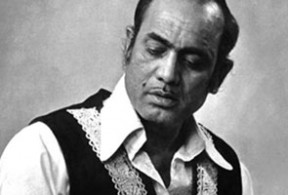
Mehdi Hassan’s voice was not the voice of populism. His was the voice of riyaz, of uncompromised passion and excellence..the kind you cannot stumble by but have to earn through years of application, commitment and diligence. This voice was not an easy voice to fall in love with, You needed to be all there..ear, mind, heart and soul to absorb its nuances, its depths, its complex layering of notes, its empathy for poetry and the poets.You could not play it in your car and expect to be entertained as you drove to work or in your home while you dusted your furniture. His voice demanded a mehfil, a prolonged pause that you could dedicate to his music. His was the voice of not an accidental ghazal singer but an ustaad who had gone through several trials by fire to commit himself to his calling, his craft.
***
There are few such artists left in the world and there are even fewer followers who expect the highest of standards to be met in art and music. Ideally, artists should create in answer to an inner compulsion and not as response to market trends. The purpose of art is to change our world view, break open blockages in perception, bring light into dark corners of the mind and change us in obvious and imperceptible ways by elevating us above the mundane, inspiring us to make more of our lives, to love more, sing more, live more. And in the process, if success comes, wide spread acclaim comes..the artist experiences a sense of vindication and fulfilment. Today, this process has somehow been twisted where the need to sell comes before the need to create and Mehdi Hassan was one of the last living stalwarts who changed the face of music but never let its commercial demands change him. That is not to say that he kept himself cloistered in the shell of classicism. He sang in multiple languages, erased borders with his voice, sang for films and collaborated with artists who admired him and who he admired.
***
But when he sang ghazals, it is then you understood just why he was called the king of this genre. He understood the heart of ghazal. That it was a thing not to be hurried, to be chewed and spat out. That each note, each word, each emotion had to be savoured slowly like wine and then when every cell of your being was suffused with its radiance, that is when your soul and not just your voice sang out. And when he sang, “Zindagi mein to sabhi pyaar kiya karte hain...Main toh mar kar bhi meri jaan tujhe chahoonga,” you believed him and also that no one before or after him could sing out the sentiment quite in the same way. What Mehdi saab did was to stamp ghazal gayaki with his voice, his adayagi, his andaze-bayan…his unique way of articulating shayari in a voice invested with 18 generations of a rich musical tradition of dhrupad, thumri, khayal and dadra. It is just inexplicably cruel that in the last few years of his life, he could no longer sing.
***
As an RJ who hosts a ghazal show, I somehow can never randomly pick and place his ghazals in my log, I place them in a company worthy of them. I had recorded a Mehdi Hassan special a few days ago which would have by a strange twist of fate, gone on air on the day of his death but for a technological glitch. I will have to record another one now, using the past tense or may be the future tense because voices like that, travel from generation to generation, from heart to heart and from soul to soul. They resonate in our dreams and inhabit the deep hollows of memory from where nothing can banish them away.
***






